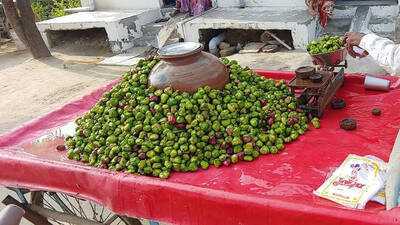
Water chestnuts, a staple in many Asian dishes, are prized for their crunchy texture and mild, sweet flavour. They are highly versatile, used in stir-fries, curries, salads, and more, and offer nutritional benefits such as fibre, vitamins, and antioxidants. However, not everyone can consume them safely. Certain individuals, including those with diabetes, kidney issues, digestive sensitivities, allergies, or those on blood-thinning medications, should exercise caution. Understanding these potential health considerations is essential to avoid side effects such as blood sugar spikes, digestive discomfort, or allergic reactions. By being aware of personal health conditions and consulting healthcare professionals when necessary, water chestnuts can be enjoyed as a safe, tasty, and nutritious addition to a balanced diet.
What are water chestnuts or ‘ singhara ’
Despite their name, water chestnuts are not nuts. They are aquatic tuber vegetables (Eleocharis dulcis) that grow in marshes, shallow lakes, ponds, and paddy fields. Native to Southeast Asia, Southern China, Taiwan, Australia, Africa, and islands across the Indian and Pacific Oceans, water chestnuts are harvested when their bulbs, or corms, turn dark brown.
The crunchy white flesh can be eaten raw or cooked, making them a staple in stir-fries, chop suey, curries, and salads. It is important to distinguish them from water caltrops (Trapa natans), which have a distinctive shape resembling bats or buffalo heads and a taste similar to yams or potatoes.
People who should be cautious in eating water chestnuts
While generally considered safe, water chestnuts may trigger allergic reactions in some individuals. Symptoms can range from mild itching and skin rashes to severe reactions such as anaphylaxis. Anyone with a history of food allergies should exercise caution and consult a healthcare professional before consuming water chestnuts.
Being aware of potential allergens can prevent uncomfortable or dangerous reactions, especially for those trying new or exotic foods for the first time.
- Considerations for diabetics
Water chestnuts contain carbohydrates that have a high glycemic index, meaning they can cause rapid spikes in blood sugar levels. Individuals with diabetes or insulin resistance should monitor portion sizes and consider pairing them with low-glycemic foods to maintain stable glucose levels.
By managing intake and timing meals carefully, diabetics can enjoy the nutritional benefits of water chestnuts without negatively impacting blood sugar control.
- Sodium content in preserved water chestnuts
Canned or preserved water chestnuts often contain added sodium, which can pose risks for people with kidney problems, hypertension, or heart disease. Excess sodium intake can lead to fluid retention and increased blood pressure.
For these individuals, choosing fresh water chestnuts or low-sodium canned alternatives is advisable. Reading nutritional labels carefully ensures safe consumption while still enjoying the unique taste and texture of this tuber.
- Digestive concerns for sensitive stomachs
Although water chestnuts are rich in fibre, they can sometimes cause digestive discomfort. People with sensitive stomachs, irritable bowel syndrome (IBS), or other gastrointestinal issues may experience bloating, gas, or mild abdominal pain.
Starting with small portions and observing your body’s response is a practical approach. Consulting a gastroenterologist can also help determine whether water chestnuts are suitable for your diet.
- Implications for blood thinners
Water chestnuts are a source of vitamin K, a nutrient essential for blood clotting. Individuals taking anticoagulant or blood-thinning medications must maintain consistent vitamin K intake to avoid interfering with their treatment.
Before adding water chestnuts to their diet, such individuals should consult a healthcare provider to ensure safe and balanced consumption.
Water chestnuts can be a nutritious and delicious addition to meals, but they are not universally safe for everyone. Being mindful of your personal health conditions, reading labels carefully, and seeking professional advice allows you to enjoy these vegetables without health risks.
Whether it’s monitoring blood sugar, avoiding allergens, or managing sodium and vitamin K intake, informed dietary choices are key. By practising caution and moderation, you can continue to explore diverse cuisines while protecting your health.
How to enjoy water chestnuts safely
Water chestnuts can be a nutritious and delicious addition to meals, but they are not universally safe. Being mindful of personal health conditions, and seeking professional guidance ensures safe consumption. Whether it’s managing blood sugar, avoiding allergens, monitoring sodium, or accounting for vitamin K intake, informed choices and moderation are key. By practising caution, you can continue to enjoy Singhara in diverse cuisines while protecting your health.
Also Read |
 Water chestnuts, a staple in many Asian dishes, are prized for their crunchy texture and mild, sweet flavour. They are highly versatile, used in stir-fries, curries, salads, and more, and offer nutritional benefits such as fibre, vitamins, and antioxidants. However, not everyone can consume them safely. Certain individuals, including those with diabetes, kidney issues, digestive sensitivities, allergies, or those on blood-thinning medications, should exercise caution. Understanding these potential health considerations is essential to avoid side effects such as blood sugar spikes, digestive discomfort, or allergic reactions. By being aware of personal health conditions and consulting healthcare professionals when necessary, water chestnuts can be enjoyed as a safe, tasty, and nutritious addition to a balanced diet.
Water chestnuts, a staple in many Asian dishes, are prized for their crunchy texture and mild, sweet flavour. They are highly versatile, used in stir-fries, curries, salads, and more, and offer nutritional benefits such as fibre, vitamins, and antioxidants. However, not everyone can consume them safely. Certain individuals, including those with diabetes, kidney issues, digestive sensitivities, allergies, or those on blood-thinning medications, should exercise caution. Understanding these potential health considerations is essential to avoid side effects such as blood sugar spikes, digestive discomfort, or allergic reactions. By being aware of personal health conditions and consulting healthcare professionals when necessary, water chestnuts can be enjoyed as a safe, tasty, and nutritious addition to a balanced diet.